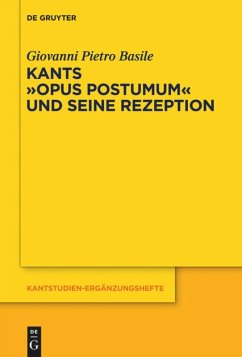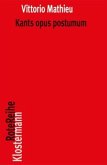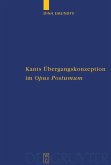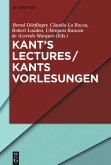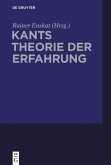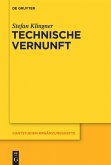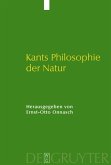This study presents the historical impact of Kantâ??s Opus postumum, the philosopherâ??s last unfinished work, in a critical discussion that extends from the time of the workâ??s initial reception in the 19th century up to contemporary Kant research. The common thread that unites this study is a systematic historical reconstruction of the disputes between those interpreters who saw this work as a major departure on the part of the late Kant from the philosophy of his critical writings, and others who saw this posthumously published work as coherently evolving from Kantâ??s earlier transcendental philosophy.
Diese Arbeit bietet eine Darstellung und kritische Diskussion der Wirkungsgeschichte von Kants Opus postumum. Kants anfängliche Auseinandersetzung mit der Problematik des Übergangs von den Metaphysischen Anfangsgründen der Naturwissenschaft zur Physik entwickelt sich derart, dass er es für erforderlich erachtet, zunehmend auf die entscheidenden Fragen der kritischen Philosophie zurückzugreifen. Die Untersuchungen im Opus postumum liefern keine definitiven Ergebnisse, und Kants spätes Denken lässt sich umso mehr nur rekonstruierend begreifen, als es in den hinterlassenen Entwürfen bloß unvollständig angedeutet wird. Das Opus postumum zu interpretieren, heißt deshalb aufzuklären, ob Kant, wenn auch nur implizit und indirekt, den früheren Transzendentalismus aufgibt, um sich an einem subjektiven Idealismus à la Fichte bzw. einem objektiven Idealismus à la Schelling auszurichten, oder ob, vielmehr das Opus postumum eine kohärente Entwicklung der kritischen Grundlegung der Philosophie bietet. Der rote Faden der hier vorgelegten Studie ist die Rekonstruktion der Dialektik zwischen den Vertretern der beiden hermeneutischen Standpunkte, getragen von der Überzeugung, dass Kant bis zuletzt die Begrenztheit des menschlichen Geistes vertritt.
Hinweis: Dieser Artikel kann nur an eine deutsche Lieferadresse ausgeliefert werden.
Diese Arbeit bietet eine Darstellung und kritische Diskussion der Wirkungsgeschichte von Kants Opus postumum. Kants anfängliche Auseinandersetzung mit der Problematik des Übergangs von den Metaphysischen Anfangsgründen der Naturwissenschaft zur Physik entwickelt sich derart, dass er es für erforderlich erachtet, zunehmend auf die entscheidenden Fragen der kritischen Philosophie zurückzugreifen. Die Untersuchungen im Opus postumum liefern keine definitiven Ergebnisse, und Kants spätes Denken lässt sich umso mehr nur rekonstruierend begreifen, als es in den hinterlassenen Entwürfen bloß unvollständig angedeutet wird. Das Opus postumum zu interpretieren, heißt deshalb aufzuklären, ob Kant, wenn auch nur implizit und indirekt, den früheren Transzendentalismus aufgibt, um sich an einem subjektiven Idealismus à la Fichte bzw. einem objektiven Idealismus à la Schelling auszurichten, oder ob, vielmehr das Opus postumum eine kohärente Entwicklung der kritischen Grundlegung der Philosophie bietet. Der rote Faden der hier vorgelegten Studie ist die Rekonstruktion der Dialektik zwischen den Vertretern der beiden hermeneutischen Standpunkte, getragen von der Überzeugung, dass Kant bis zuletzt die Begrenztheit des menschlichen Geistes vertritt.
Hinweis: Dieser Artikel kann nur an eine deutsche Lieferadresse ausgeliefert werden.

